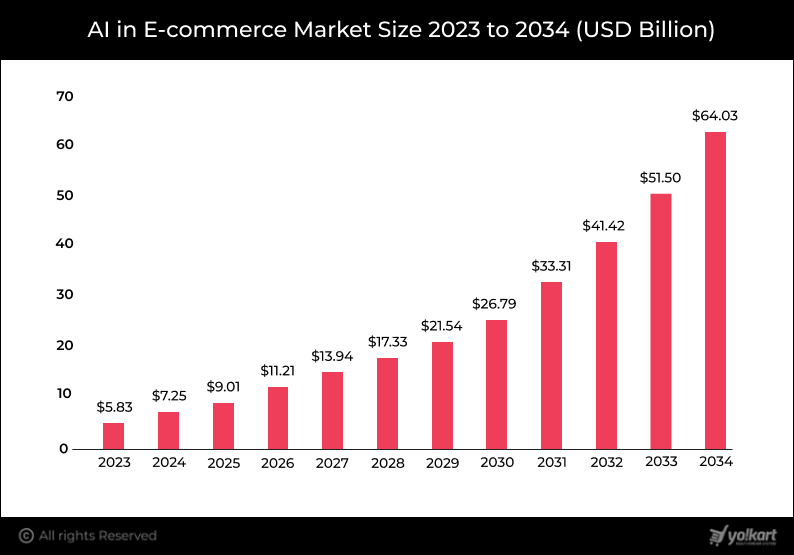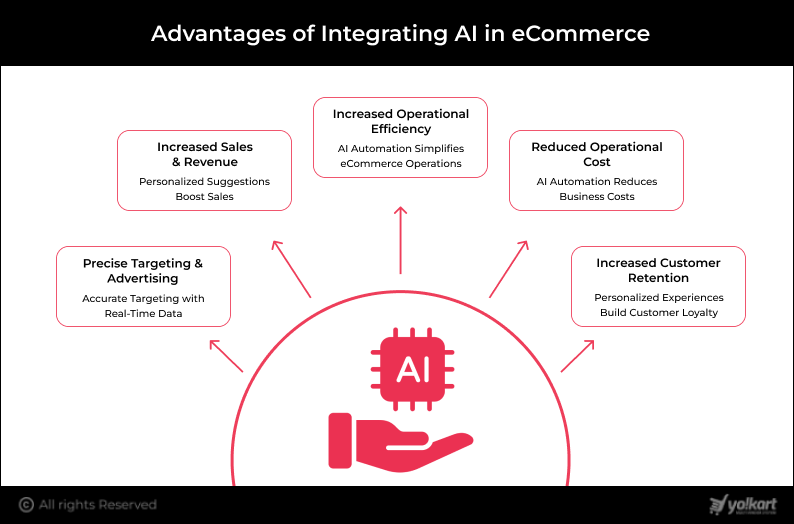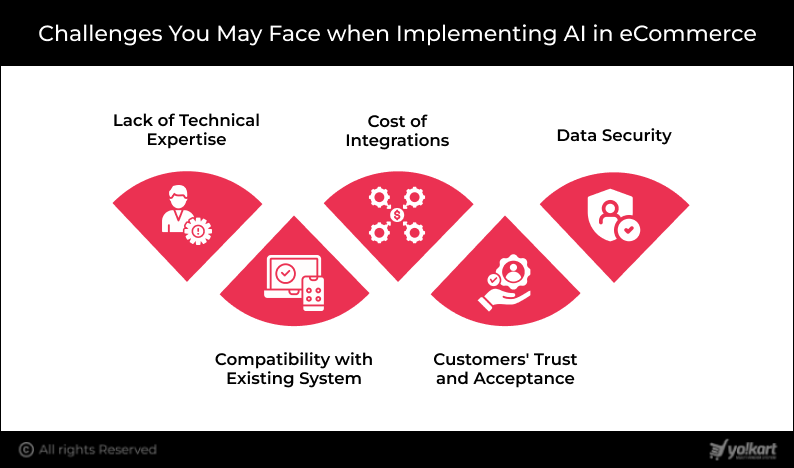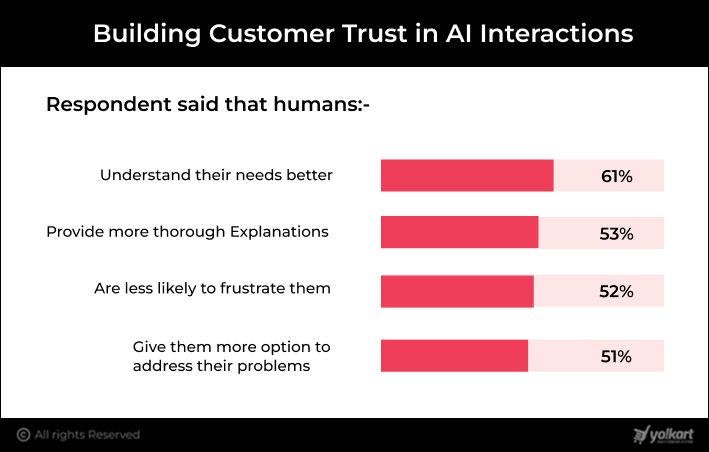Published Date 28th Oct, 2025
The world is witnessing the greatest evolution ever. Thanks to the multifaceted contribution of AI (Artificial Intelligence). Especially in the eCommerce landscape, it’s acting as a catalyst.
According to Precedence Research, the global AI (Artificial Intelligence) in eCommerce market size is anticipated to grow at a CAGR of 24.34% to reach around $64.03 billion by 2034. The data demonstrates how eCommerce businesses will rely on and come to trust AI.

However, decades ago, shopping meant visiting a physical store. A few years ago, eCommerce revolutionized shopping by allowing customers to shop online with ease. Today, the eCommerce world is experiencing the greatest transformation by integrating AI.
Hence, whether you are operating an eCommerce business or planning to introduce one, you can’t ignore the significance of AI integration into your platform. Let’s explore more about the importance of AI (Artificial Intelligence) in eCommerce.
By exploring this guide on how eCommerce AI is transforming business in 2025-2026. You will explore all the key aspects of AI, its introduction, advantages, challenges, implementation in eCommerce and more.
Table of Contents
- What is AI (Artificial Intelligence) in eCommerce?
- How Does AI Work for eCommerce Businesses?
- How is AI Revolutionizing the eCommerce Landscape?
- What are the Advantages of Integrating AI in eCommerce
- Popular eCommerce Platforms Incorporated AI
- Challenges You May Face when Incorporating AI into eCommerce
- Use Cases of AI in eCommerce: Entrepreneurs and eCommerce Businesses Should Know About
- How to Implement AI into Your eCommerce Business?
- What Makes Yo!Kart the Right Choice for Businesses Looking for an AI-Powered eCommerce Solution?
- Conclusion
- FAQs
What is AI (Artificial Intelligence) in eCommerce?
AI (Artificial Intelligence) in eCommerce is technology that closely monitors customers’ behaviour, analyzes data, automates operations, optimizes performance and helps drive growth. eCommerce AI is all about understanding customers better, making actions faster and selling products or services smarter.
For eCommerce businesses, AI (Artificial Intelligence) is no longer an option but an indispensable tool to compete and grow. From providing valuable insights in real-time to helping plan strategies and target potential customers, AI is the right solution if utilized correctly.
How Does AI Work for eCommerce Businesses?
AI in eCommerce works for both the customer-facing side and the back-end operational side.
For example, AI offers personalized recommendations by analyzing customer behaviour, purchase history, searches and more. On the other hand, it automates operations like inventory management, pricing adjustments (dynamic pricing) and more by integrating with the back-end.
In addition, integrating AI with your eCommerce business is more than you expect. Think you’re a personal assistant who can shop for you as per your command.
Several eCommerce platforms have tried and tested AI Shopping agents. How they work is that customers simply give a command and autonomous shopping agents execute.
Suppose you gave a command to buy me a laptop under $1000 that works best for you based on its reviews and ratings. The shopping agent will search, find, match and place the order on your behalf. You can give more commands to get more personalized results, search for the laptop’s company, color, specifications, and much more.
How is AI Revolutionizing the eCommerce Landscape?
In recent years, the number of online shoppers has grown at a good pace. They are highly influenced by the convenience, accessibility and availability 24/7. At the same time, businesses are also getting access to a wider customer base, able to access data effortlessly and plan strategies accordingly.
Now, the customers’ demands and expectations of the businesses are on the higher side. That’s where AI in eCommerce comes in. It serves equally to customers and businesses.
Let’s explore some key stats of AI and the eCommerce industry.
- According to Market.US and other resources, AI will handle 80% of customer interactions by 2030.
- A survey conducted by NVIDIA states that about 89% of businesses are either using AI or experimenting with it in any way.
- 51% of eCommerce businesses use AI to ensure customers have a smooth shopping experience.
- AI product recommendations can boost sales by 59% according to Market.US
- The adoption of AI in eCommerce is going to significantly reduce operational costs by 2030.
- A significant percentage of customers admit that AI enhances their overall online shopping experience.
- Over 50% of customers think that AI chatbots will be able to conduct human-like conversations by 2026.
- About 77% consumers are likely to adopt AI-powered services and devices. ;
Launch a Thriving eCommerce Platform Using a Readymade Solution
What are the Advantages of Integrating AI in eCommerce
The shift towards AI integration has brought amazing results for eCommerce businesses. A significant percentage of eCommerce businesses admit that AI has transformed their interaction with customers and helped them gain a competitive advantage.
From enhancing overall shopping experience to precisely targeting potential customers and optimizing performances and automating processes, AI has transformed everything essentially required for growth and evolution.
Take a look at some advantages of integrating AI and explore what it can bring to your eCommerce business.

1. Precise Targeting and Advertising:
Earlier running campaigns and precisely targeting users were too complex. A thorough market research, analysis and feedback were needed. Sometimes, it was more about predictions and gut feelings with a very less winning probability.
However, today, marketers are able to make real-time data-driven decisions and target potential customers precisely, expecting more conversions and outcomes (ROI – Return on Investment).
2. Increased Sales and Revenue
Approaching the right person, at the right time, with the right resolution helps boost sales and generate more revenue. By incorporating AI into eCommerce platforms, businesses are able to connect with customers in real-time.
For example, think of personalized recommendations on Amazon. You often get recommendations for products or services that you need, you have wanted to buy or planned to book. There is a high probability that you can proceed to checkout, ultimately contributing to higher conversion rates, more sales and revenue for Amazon.
It explains exactly how connecting the right person, at the right time, with the right resolution helped Amazon convert a visitor into a customer, boost sales and overall revenue generation. Talking about numbers, Amazon’s 35% sales come from personalized recommendations, that itself a statement.
3. Increased Operational Efficiency:
AI can help automate manual tasks to improve efficiency, streamline workflow, speed up processes and reduce the chances of errors. Hence, by incorporating AI into your eCommerce business, you can automate repeat manual tasks and much more by reducing time and effort.
From inventory management to responding to customers on time, AI can help you handle everything effortlessly. It can help you get more tasks done without the need for human intervention.
Amazon is one of the most popular multi-vendor marketplaces known for automating processes and tasks using AI. From supply chain management to inventory management, order fulfillment to delivery timeline optimization, and personalized recommendations to cloud-based AI services, Amazon has set an example on how AI Automation can transform an eCommerce business.
4. Reduced Operational Cost
AI-powered automation also reduces operational costs. It minimizes the need for human resources, resulting in minimized expenses. Further, it lets businesses invest money and resources in other areas of their growth and expansion.
- According to McKinsey, AI-powered supply chain management can reduce logistics costs up to 15%
- AI helps businesses maintain optimal stock by accurately predicting demand, resulting in reduced inventory management costs by 10 to 40%.
- It reduces customer support costs by 30 to 60% by resolving regular customers’ queries.
- Data-driven campaigns reduce the cost up to 50% required for customer acquisition.
5. Increased Customer Retention
Personalized shopping experiences don’t just increase sales, conversion rates, and revenue but also help the platform build a loyal customer base. It helps businesses retain customers.
Moreover, customers feel more comfortable with a platform that offers a seamless and personalized experience. It also increases the chances of repeat purchases.
Popular eCommerce Platforms Incorporated AI
AI-powered eCommerce businesses have always been a preferred choice for customers. By integrating AI with their platform, businesses have not just enhanced customers’ online shopping experiences but have also grown a lot. Let’s explore a few popular eCommerce businesses incorporating AI into their platforms.
1. Amazon’s Personalized Product Recommendations
Who doesn’t know the name of Amazon, the global eCommerce giant? Its product recommendation technology is a smart integration in the eCommerce world. Of course, a cornerstone of Amazon’s success. The technology leverages generative AI to recommend personalized products and content on Amazon. Works as an effective selling strategy for Amazon by driving an estimated 35% of its sales.
2. Amazon’s Alexa: An AI-Powered Voice Assistant
Amazon’s Alexa is an AI-powered voice assistant that enables interaction using voice commands. It answers questions, follows commands and controls smart devices. The device is managed by various artificial technologies, including NLP (Natural Language Processing), generative AI and more, to understand and respond to commands.
3. Wayfair’s AI Solution to Reimagine Interior Design
Wayfair is a large online marketplace focused on the dropshipping model. The platform connects thousands of sellers with potential buyers, buying and selling millions of home goods, including furniture, decor, and other home products.
Wayfair has developed Muse to style a space. It’s an AI-powered tool that generates and suggests images and designs based on input given or the image uploaded. Once accomplished, it links those images to Wayfair’s shoppable catalog, allowing users to save, shop, or refine results.
4. eBay Using Generative AI to Support Businesses
eBay is another popular multi-vendor marketplace that utilizes AI in many ways, such as streamlining seller workflows, enhancing buyer discovery, personalizing marketing, and strengthening trust and safety. For sellers, many businesses on the platform help in many ways.
- eBay streamlines the listing process, helps them generate content including item titles, descriptions, categories and even pricing suggestions. Its magical listing tool uses artificial intelligence to gather information about listings from images.
- eBay’s advanced AI tool enables sellers to remove unwanted background from the image and replace it with a clean one, making the photo more professional for a greater experience.
5. Walmart Crafts a Unique Homepage for Individual Customers Using AI
Walmart is crafting a personalized shopping experience for the individual customer, leveraging AI. The technology understands the customers accessing data and insights and showcases personalized products, content or services that the customer likes.
There are many more such marketplaces and eCommerce platforms that have incorporated AI (Artificial Intelligence) and shown results by improving overall customers’ experience, generating more sales and more. In addition, in the upcoming years, eCommerce businesses will heavily rely on AI and are still working on the improvement areas at a good pace.
Build a Marketplace Like Amazon, eBay, Walmart and Wayfair
Challenges You May Face when Incorporating AI into eCommerce
It’s not a jaw-dropper that you may encounter challenges as well when implementing AI into your eCommerce business. Because advantages bring disadvantages too. That’s where a smart business move is required. Here are a few challenges you may encounter, need to be aware of and should be prepared for:

1. Lack of Technical Expertise
Implementing emerging technology requires specialized skills. Hence, eCommerce businesses need to find the right talent for the job. At the same time, AI Engineers are in high demand, which leads to talent shortages, too.
2. Compatibility with Existing System
Integrating AI into your existing system can lead to compatibility issues. It may bring several technical challenges. Primarily, the nature of AI makes it good only for the technology they are built for. Integrating an AI tool with a system not compatible with it can bring unexpected consequences.
3. Cost of Integrations
Businesses with a small initial investment can face challenges when integrating AI into an eCommerce system. Because implementing AI requires higher investment, ongoing maintenance and updates.
4. Customers’ Trust and Acceptance
According to a report, about 90% of customers prefer interaction with a human rather than interacting with an AI chatbot when it comes to getting customer support and personalized interactions.

5. Data Security
Data security and privacy are the biggest concerns for eCommerce businesses when it comes to integrating AI. Because it requires access to the customers’ data, this raises concerns related to data vulnerability.
Use Cases of AI in eCommerce: Entrepreneurs and eCommerce Businesses Should Know About
AI (Artificial Intelligence) has revolutionized the eCommerce industry. However, not because it’s emerged as a new technology, but has been incorporated with eCommerce seamlessly, delivered results, accepted by customers and adopted by businesses.
However, AI can be used in several ways. Below are a few use cases of AI in eCommerce. By exploring these use cases, you will get to know how AI can transform eCommerce businesses and be a game-changer technology.
1. Personalized Recommendation
Think of visiting an eCommerce platform to buy something and you see the platform is showcasing or recommending the same product you are looking for before you even search. This is something called personalized product recommendations. It’s a key highlight for businesses in the eCommerce industry.
AI has made it possible for businesses to understand customers so closely and offer the right products in real-time, which they are looking for with a high probability to convert a visitor into a customer.
AI predicts what customers are most likely to buy based on customers’ data, such as purchase history, searches, browsing behaviour, and more. In short, on the one hand, personalization offers an enhanced shopping experience to the customers. On the other hand, AI lets businesses grow by driving more sales and generating more revenue.
2. Dynamic Pricing
AI enables businesses to strategize pricing by implementing a dynamic pricing option. It automatically adjusts pricing, ensuring businesses can drive more sales and make maximum profits. However, this AI-powered technology responds considering a range of factors such as demand, inventory level, competitors’ pricing, buying behaviour, market trend and more.
In short, the AI technology utilizes an algorithm to adjust pricing in real-time. It is primarily focused on supply and demand, leading to better conversion, higher profits and maximum sales.
Amazon and Walmart are popular multi-vendor eCommerce marketplaces that update prices multiple times a day using an AI-driven dynamic pricing model based on demand, supply, competitor moves, margins, and more.
3. AI-powered chatbots
The advancements of AI have revolutionized the way businesses interact and connect with customers. eCommerce businesses are widely using AI chatbots and virtual assistants in order to provide quick responses. The integration of AI with conversational commerce enhances overall customer experience and helps businesses build a loyal customer base.
Using these technologies, businesses ensure customer service 24/7. Chatbots and AI agents can respond and resolve common queries, but not to personal and complex queries, exactly like humans. However, you can’t predict the future. The advancements of AI can make it possible.
4. Voice and Visual Search
Customers prefer platforms that are fast, convenient and ensure seamless transitions. AI-enabled voice and visual search options enable customers to find results faster and conveniently.
On the one hand, Google Assistant, Alexa, Siri, and more are allowing customers to complete transactions by interpreting and processing their languages. On the other hand, AI-enabled visual search technologies enable users to find products using images they are most likely looking for.
5. Demand Forecasting
Sales demand forecasting is a major advantage of integrating AI in an eCommerce business today. Using this technology, businesses are able to maintain inventory, prevent overstocking and meet customers’ demand. They are gaining more accurate and calculated data based on trends, customers’ demand, real-time data and more.
Earlier, a significant percentage of businesses were relying on traditional methods and they used to plan strategies based on predictions, which led to potential losses. However, by incorporating AI into eCommerce businesses, they can make better decisions based on the signals and insights.
6. Generative AI in eCommerce (Content & Design)
eCommerce businesses are increasingly utilizing generative AI to generate content such as product descriptions, creative copies and more. At the same time, they are also creating and editing images using AI. The technology is helping them save time and effort.
7. Fraud Prevention
A large number of eCommerce businesses use AI-powered fraud detection tools to prevent fraud. The technology detects fraudulent transactions and unusual activities. Algorithms are trained to detect red flags and unusual activities such as high-volume purchases using new accounts, failed login attempts, multiple repeat orders, and more.
8. SEO and Ad Campaigns
AI allows businesses to manage SEO and marketing campaigns more efficiently. The technology helps in creating and testing meta titles, meta descriptions, descriptions, email copies, creative content and more. Moreover, AI in eCommerce lets businesses test content and ads dynamically to decide which one will work best.
9. Inventory Management
AI-powered inventory management helps eCommerce businesses maintain their stocks efficiently. It integrates with your platform and supply chain to improve efficiency. The technology monitors real-time stock, automates reordering based on demand and future predictions.
10. Immersive Shopping Experience
AI and AR work together in eCommerce to offer an immersive shopping experience, bridging the gap between online and offline. On the one hand, AI algorithms analyze data and understand preferences to provide tailored shopping experiences. On the other hand, AR (Augmented Reality) lets customers visualize digital products in the real world before making a purchase.
How to Implement AI into Your eCommerce Business?
The implementation of AI into your eCommerce business can give a boost. All you need to do is follow the right approach to avoid surprises. However, if you are an entrepreneur or an eCommerce business owner who wants to implement AI, you can follow the essential steps below for a successful integration.
Step 1: Define Your Objective
First and foremost, what needs to be done is to define your requirements. It clearly means you need to know exactly what you want, the outcome you want to achieve by implementing AI into your eCommerce business.
Step 2: Find the Right AI Tool
Once you have finalized your requirements. Now the next step is to find the best AI tool that can solve your purpose. Be careful, don’t just proceed with the random one. Several considerations are there that you need to be mindful of, such as scalability support, system compatibility, costs and more.
Instead of choosing AI solutions readily available in the market, you can also go for custom development if it works for you.
Step 3: Integrate AI into Your eCommerce Business
After deciding on the right and most suited AI tool, the next step is to integrate the solution into your eCommerce business.
However, you can’t ignore the importance of organizing data properly before you integrate AI into your eCommerce business. AI is a tool that works, gives results or responds to queries based on data provided or available to it. The more precise and accurate your data is, the better response you can expect. In case of false and unorganized data, the outcomes will be surprising
Step 4: Monitor Performance and Update
The job is not done with the integration of AI into your eCommerce Business. Continuous monitoring, performance optimization, time-to-time updates, following trends and others are a few critical requirements. Following them can help improve user experiences, keep your platform competitive and achieve goals.
What Makes Yo!Kart the Right Choice for Businesses Looking for an AI-Powered eCommerce Solution?
For businesses that prioritize customer experience, operational efficiency and want to improve interactions on the eCommerce platform, the integration of AI into their eCommerce business is no longer an option but a necessity. By investing in this cutting-edge technology, businesses grow at a good pace by enhancing customer experience and boosting sales.
If you are one of those entrepreneurs or business owners looking for a customizable eCommerce solution that supports AI implementations and customizations based on their personalized needs, Yo!Kart can be the right choice for you. This feature-rich eCommerce solution is set to offer AI-enabled services.
From generating SEO-friendly product descriptions to creating high-quality professional images, Yo!Kart can help you handle everything quickly and easily without any significant challenge. In addition, if you want additional AI-enabled features or services, Yo!Kart’s compatibility with APIs and third-party integration breaks all the barriers and lets you integrate your preferred AI tools.
Moreover, if you want the gain access to the team behind Yo!Kart for additional customization and improvements, you can also connect with experts and get the job done. In short, by getting started with Yo!Kart, you don’t just get a readymade solution but the entire ecosystem that helps you transform your idea into a thriving business.
Explore Out-of-the-Box Features of Yo!Kart
Conclusion
The development and advancements of AI (Artificial Intelligence) can help your eCommerce business reach new heights if implemented and accessed properly. The integration of AI doesn’t just enhance the overall online shopping experience but enables businesses to streamline operations, speed up processes, serve customers, target potential customers, boost sales, increase conversions and more.
In short, in eCommerce, there is not a single area where AI can’t contribute. By incorporating AI in eCommerce, you can serve your customers better and drive success for your business.
Moreover, by choosing Yo!Kart as your eCommerce solution, you will not just introduce a feature-rich online multi-vendor marketplace, but can also leverage the advantages of advanced AI tools.
FAQs
Q 1. What is eCommerce AI?
Ans. eCommerce AI refers to the integration of Artificial Intelligence in eCommerce. By using this technology, eCommerce businesses are improving the online shopping experience for customers, automating their manual tasks and streamlining processes. From personalized recommendations to voice and visual searches, and from generating content to creating professional images, the integration of AI into eCommerce is making the online shopping experience seamless for everyone.
Q 2. How does AI in eCommerce improve customer experience?
Ans. AI in eCommerce enhances customer experience in many ways. Such as:
- Personalized Product Recommendations: Whenever a customer visits the platform, they feel like it’s specially designed for them which improves overall customer experience.
- Better Search Options: Customers don’t need to type manually to search products. They can search products either using voice command or can find similar products using images. The NLP (Natural Language Processing) technology understands the actual intent behind the customer’s query and helps them find more accurate products.
- Improved Customer Services: AI-powered chatbots are enabling businesses to offer customer support 24/7, which ultimately improves customers’ experience.
In addition, several more offerings are enhancing the overall online shopping experience of the customers on the eCommerce platforms.
Q 3. How does generative AI work in eCommerce?
Ans. Generative AI in eCommerce can help create content, automate tasks, generate images, provide support, optimize inventory management, adjust pricing, recommend products, provide data and insights, and do much more.
Q 4. What is the role of AI in personalized product recommendations in eCommerce?
Ans. AI suggests or showcases products customers are interested in or likely to buy. It analyzes vast amounts of data, customers’ behaviour, their search history, buying patterns and more to recommend personalized products. Personalized recommendation ultimately enhances overall customer experience and boost sales for the businesses.
Q 5. Can I integrate AI into my existing eCommerce business?
Ans. Yes, you can integrate AI into your existing eCommerce business if it supports it. However, you need to connect with the right experts who can help you integrate AI.
Click Here to Get Connected with an eCommerce Software Expert
Q 6. What are the key areas where I can integrate AI?
Ans. You can integrate AI in many ways. However, the key areas include:
- Personalized recommendation
- Customer support
- Inventory management
- SEO and marketing
- Fraud detection and management
- Streamline Manual operation and more.
Q 7. Does AI offer 100% accuracy?
Ans. You can’t be 100% sure about the accuracy of AI. Because AI itself does generate anything. It clearly operates based on the data provided or the input given. Hence, the results produced or the actions performed by AI are highly influenced by data.
Q 8. Is AI biased?
Ans. AI provides output based on the input provided or its access. If the data AI is accessing is biased, then there is a higher chance of giving biased results. Even several studies and reports admit it.




